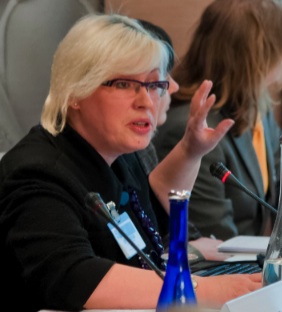CONFERENCE | by Camilla Azzini
Left Behind – Brussels Conference: Inete Ielite
 Biographical note:
Biographical note:
Chair of the Board at Children’s Forum of Latvia, Ms. Ielite has been working for human rights for more than fifteen years, promoting development of civil society in Latvia and participation of the most disadvantaged groups. She has been involved in creating new legislation, policies and services for children, young people and families both through professional and voluntary work.
Ms. Inete Ielite is a founder, one of the elected decision makers, researcher and reporter for national and international organisations makers and also spokesperson for Children’ Forum of Latvia, one of the most active non-governmental organisations in Latvia.
Ms. Inete Ielite was Personal Representative of Prime Minister of Latvia to the Preparatory Committee for the UN GA Special Session for Children. She currently represents Latvia at European Institute for Gender Equality and regularly carries out several duties on behalf of the NGO sector in Latvia to promote cooperation with the parliament, government and local authorities such as leadership in EU 2010 European Year for Combating Poverty and Social Exclusion.
Abstract of presentation:
‘Joint solutions necessary’
Poverty, high unemployment and social exclusion in Latvia are amongst the drivers of the migration, as well as the hope for better life, irrespective of the damages to the family. The population at risk of poverty in our country varies from 19% in 2004 to 26% in 2010, the highest in European Union, and yearly thousands of people leave the country. But the statistics does not provide data on families, who emigrated or the number of children leaving the country.
Reports on drop-outs and increasing cases of offences required urgent actions. The government tried to identify the situation of children left behind and fight the social exclusion in the plan for 2006-2009. The measures that required political support, coordination of the various stakeholders and finances were not implemented. And data on children left behind is not available for national child protection services even in 2011, and as the result - no action.
The most important actors dealing with the problems from the child perspective are the municipalities and non-governmental organisations. For example, the third biggest city – Liepaja – keeps regular monitoring and provides support to children. But the numbers of children concerned have doubled in five years, reaching 780 children in 2010. Non – governmental organisations are also active. Youth groups and child advocacy organisations are helping children and youngsters to deal with problems and depression, support integration activities and work towards policy development. But there is lack of resources.
Most problems encountered by children and local communities: children are left without legal guardians – they stay with grandparents, older siblings or just strangers to children; almost every child has psychological problems, many have behavioural disorders, etc. Only a few, mostly secondary school students are maturing early, taking responsibilities and dealing with life as adults.
Certainly, there is a need of action at the European level as governments and non- governmental organisations can not address the phenomenon alone.

